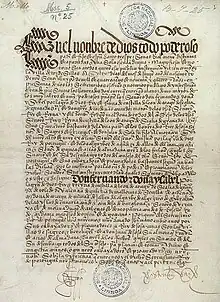Treaty
A treaty is a written agreement between two or more parties. International treaties are covered by international law. The parties may be countries or other important groups. A treaty may be about any subject.

Two countries might agree to stop a war, or declare war on a common enemy. Very common are treaties where a country promises to come to the aid of another country if the other country is attacked. Treaties about trade are also common. They may allow allow each other's citizens or merchandise to cross borders freely. For example, the European Union is set up by treaties between most of the European nations. It arranges that trade of products and services is free between the member states of the European Union.
In general, treaties are usually used to settle disputes, or to avoid disputes.
Famous treaties
- 1494 - Treaty of Tordesillas
- 1783 - Treaty of Paris (1783)
- 1814 - Congress of Vienna
- 1840 - Treaty of Waitangi
- 1919 - Treaty of Versailles
- 1928 - Kellogg-Briand Pact
- 1935 - Roerich Pact
- 1938 - Munich Agreement
- 1944 - Bretton Woods Agreement
- 1945 - United Nations Charter (not strictly a treaty)
- 1947 - General Agreement on Tariffs and Trade
- 1949 - North Atlantic Treaty
- 1955 - Warsaw Pact
- 1957 - Treaty of Rome
- 1968 - Nuclear Non-Proliferation Treaty
- 1992 - Treaty of Maastricht
- 1993 - United Nations Framework Convention on Climate Change
- 1998 - Good Friday Agreement